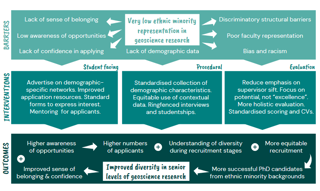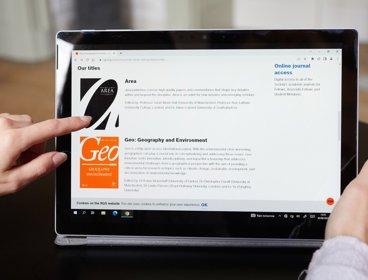 A recently published paper by Fernando et al. in Nature Geoscience has shared recommendations from the Equator project – a collaboration between a team of researchers, the Society and other professional bodies, grassroots organisations, academic institutions and the public sector – to improve equity and representation in geoscience postgraduate research.
A recently published paper by Fernando et al. in Nature Geoscience has shared recommendations from the Equator project – a collaboration between a team of researchers, the Society and other professional bodies, grassroots organisations, academic institutions and the public sector – to improve equity and representation in geoscience postgraduate research.
Geoscience is one of the least ethnically diverse science disciplines in the UK, with research showing that a lack of diversity negatively impacts the effectiveness of research teams and their partnerships with the communities they serve. Efforts to improve access and participation have been expanding in recent years, with many bodies recognising the need to invest in this work. Nonetheless, representation at senior levels within academia and industry remains poor.
To help increase access to and participation in doctoral study and research careers for Black, Asian and minority ethnic students, earlier this year the NERC-funded Equator project brought together students and researchers from both within and outside academia to take part in research summer schools and mentoring programmes. A second strand of work focused on PhD admissions practices, involving a working group of seven UK doctoral training organisations.
The outcome is a collection of recommendations, drawing on evidence from across project strands, aimed at making recruitment into doctoral programmes more equitable. These recommendations are divided into three themes: student-facing, evaluative, and procedural. They cover suggested interventions such as pre-application support, paid research placements, reformed assessment metrics, and standardised demographic data collection.
The barriers to increased representation, suggested interventions, and cycle of intended outcomes are summarised in the figure below.

The recommendations are not exhaustive and the authors stress that successful implementation will require sustained investment of time and resources from academic institutions and funders. Tailored support to ensure representation and retention of PhD students throughout geoscience programmes will be equally vital to making the community more equitable, diverse and inclusive.
The Society is encouraging all those involved in PhD admissions to action these recommendations in their own procedures and processes.
To find out more about the study and the recommendations, see:
-
Fernando, B., Giles, S., Jackson, C. et al. (2023) Strategies for making geoscience PhD recruitment more equitable. Nat. Geosci. https://doi.org/10.31223/X55W7K.
-
Or you can access a publicly available version of the article via EarthArXiv.




